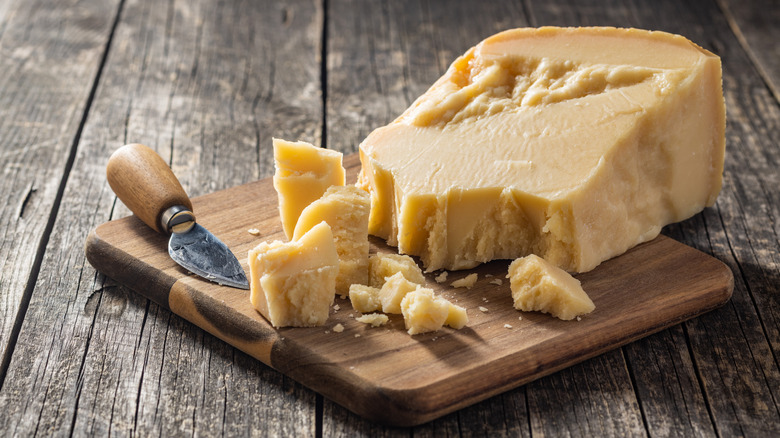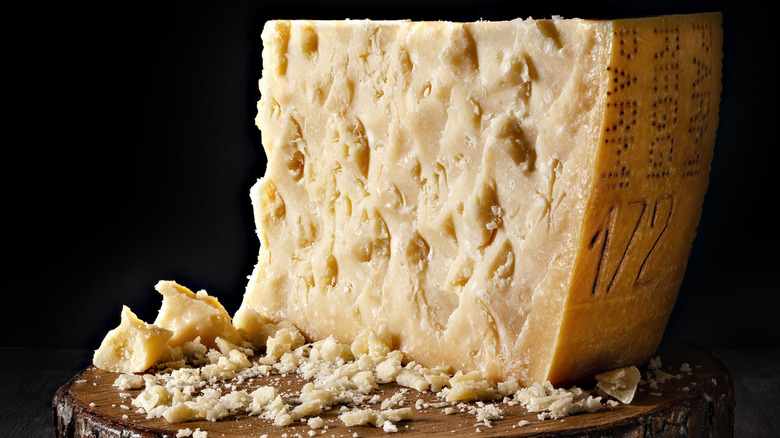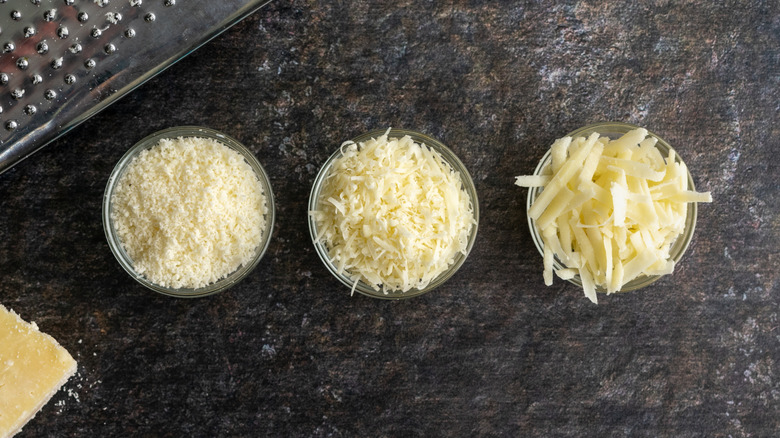The Savory Italian Cheese With More Protein And Calcium Than Eggs
Eggs are a morning staple for many and a nutritious way to start your day. So, it might come as a surprise to find out that there's a cheese that's healthier for you than an egg. An Italian cheese by the name of Parmigiano Reggiano packs more of a nutritional punch. When you break it down per serving, Parmigiano has more protein, calcium, zinc, and magnesium while having similar fat levels. On top of that, the cheese has lower cholesterol and is a low-carb food, assuming you make sure you get real deal Parmigiano Reggiano.
The cheese is strong-tasting and versatile, with nutty notes and a savory bite that makes it ideal for dinners as well as breakfasts. It's not perfect, however. You should note that a single 25-gram serving of Parmigiano Reggiano has about 105 calories, whereas a single whole egg has 72 calories. The cheese is also high in sodium, at about 20% of your daily intake, so there are a few areas where eggs still win out. However, in general, Parmigiano is a superior health food.
What makes Parmigiano Reggiano nutritious
It may sound weird to think that a little chunk of cheese is healthier than an egg, but there are a few reasons this turns out to be true. Research indicates that the high calcium levels in a 25-gram serving, which contains 36% of your daily calcium, can help keep bones strong, lower the chances of osteoporosis, and may boost the immune system. Besides the raw nutritional facts, parm has many other dietary benefits. Studies have shown that the cheese contains beneficial bacteria that can aid in the long-term function of human digestion. For lactose-intolerant people or those with sensitive stomachs, this cheese may be your best friend, because it also contains absolutely no lactose.
In addition, this cheese stands strong when it comes to food safety. The low moisture content results in a cheese that doesn't tend to grow mold or putrify, as long as it's kept cold. Parmigiano Reggiano lasts a long time once sliced, and even longer if left unsliced, meaning you can use small portions of it in various aspects of your cooking without fear of it going bad. It can even sit on the counter for about a week without refrigeration.
Not all parm is created equal
If you're wondering about whether Parmigiano Reggiano is just a fancy name for parmesan, the answer is no. Parmesan is an overarching name that includes several types of Italian cheeses, including Parmigiano Reggiano, Grana Padano, and Pecorino Romano. While all of these cheeses can be delicious and really shine with pastas and bakes, they have slightly different nutrition offerings and tastes. If you're looking for that good protein and calcium combo, Parmigiano Reggiano is where it's at. You should also note that if you're looking to get all this nutrition from the powdered parm you can find in a shaker can, you'll be sorely disappointed. There's less calcium, protein, and most other nutrients in the same serving size.
If you're a vegetarian, you'll also need to be careful which Parmigiano you pick, and the high-quality stuff likely won't work for you. While there are a few vegetarian varieties, the cheese usually uses rennet during its creation, which is derived from an animal. This means that vegetarians should steer clear of parmesan cheeses or just stick with eggs. If you're still set on starting your day with eggs for other reasons, though, consider adding a little Parmigiano Reggiano to boost their nutrition levels.


